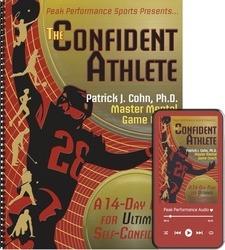
Applying Mental Skills to Competition
Many athletes struggle with applying mental skill to competition. They understand mental game strategies well, but fail to use what they learn when performing. Mental skills, just like physical skills must be practiced to make them part of you. In this article, I’ll discuss how you can improve your success with applying mental skills to competition.
Here’s my model for applying mental skills: Education and Learning –> Practice and Repetition –> Application to Practice.
After you learn and understand mental game strategies, you’ll want to use them in practice. For example, if you are working on coping with distractions, you’ll want to practice refocusing or using the Three Rs in practice. Once you become proficient in practice with refocusing, you’ll be able to do it in competition easily.
How can you improve your learning so you can take it to practice? First, I suggest to my students that they review their mental strategies often. For example, you might read your refocus statements each day to make them well-learned and to remind yourself. Repetition is key here like anything else.
Many athletes have MP3 players. I do summaries for my students on audio or short podcasts they can use prior to practice and competition. This way, you can review what you know by audio as well as written materials.
Another option is to integrate your mental skills into your pregame and preshot routines. The pregame routine is an ideal time to review your mental strategies to help you focus, be confident, and trust in your skills prior to competition. The pregame routine is an excellent time to review your confidence resume to boost confidence or expel high expectations, for example.
If you play a self-paced sports such as tennis, golf, or pool, you can use preshot routines to help you apply your mental game strategies.
Preshot routines have many of the elements you’d want for a strong mental game, such as this routine for golf:
PLANNING – Select target and the type of shot you want to hit. Be specific and commit to plan.
IMAGE – See or feel the type of shot you selected in the plan. Make it real. Use the 3 C’s before you approach the ball: Clarity, Confidence, and Commitment.
REHEARSAL – Use a practice swing to feel the shot you want to hit. Don’t just take a mindless swing.
FOCUS – Stay focused on execution and the target/feel of the shot.
AIM/ALIGN – Aim clubface and set body parallel left of clubface.
TRUST – Focus on the target and let the image of the target or the feeling of a good swing trigger the swing.
In addition, you want to assess how you are doing with your mental game after each compeition as soft of a personal check up. You can use a journal of use a worksheet to help you assess how you did with certain mental skills you are working to improve. For my Tennis Confidence CD program, I offered worksheets players can use after each lesson. Here’s an example from one of the worksheets or post-match assessments on managing expectations:
Directions: Please answer the following questions based on the mental strategies you learned in Session One about managing expectations by using Process Goals in Tennis Confidence:
–What are two things you did well today with your mental game and performance?
–What are two things you would like to improve for the next match?
–What expectations, if any, did you have going into the today’s match that you were aware of?
–What were your process goals for today’s match or tournament?
–How well did you discard your expectations and replace with your small objectives or process goals?
–At what time did you start to protect your lead and allow a comfort zone to cause you to tighten up or play protectively?
–What did you learn about replacing your expectations with manageable process goals that you can apply to future tournaments?
Finally, you want to continue to assess and refine your mental game after each competition. You learn a new skill such as refocusing, apply it to practice, review it often, take it to competition, and then assess how well you did with your application of that skill. You then can make any modifications or tweaks to your well-learned mental skill.
Related Sports Psychology Articles
- How to Practice and Apply Your Mental Game
- How to Apply Mental Game Strategies – Webinar 3
- Helping Athletes Apply Mental Game Lessons
*Subscribe to The Sports Psychology Podcast on iTunes
*Subscribe to The Sports Psychology Podcast on Spotify
Download a free sports psychology report to improve your mental game!
Learn more about our one-on-one mental game coaching.
The Confident Athlete

“The Confident Athlete” consists of 2 audio programs that include 14 days of confidence fueling exercises and a simple to follow workbook that guides you through the 14 days, helps you apply the strategies, and customizes the exercises to your personal needs.
Let me help you put a stop to the confidence leak. You can learn to have greater levels of confidence in competition than you do in practice by identifying the specific ways you undermine your own confidence and how to convert your practice confidence into COMPETITIVE CONFIDENCE.
“The Confident Athlete” is a ground-breaking system to teach you how to think like a champion and have ultimate self-confidence every time you step on the playing field, court, track, or course. The confident athletes was developed for any athlete – junior to professional –that wants to gain confidence. However, coaches and sports parents can learn how to teach others to perform with ultimate confidence. Use my program if you want to bust a slump or just wanting higher or more consistent levels of self-confidence.
